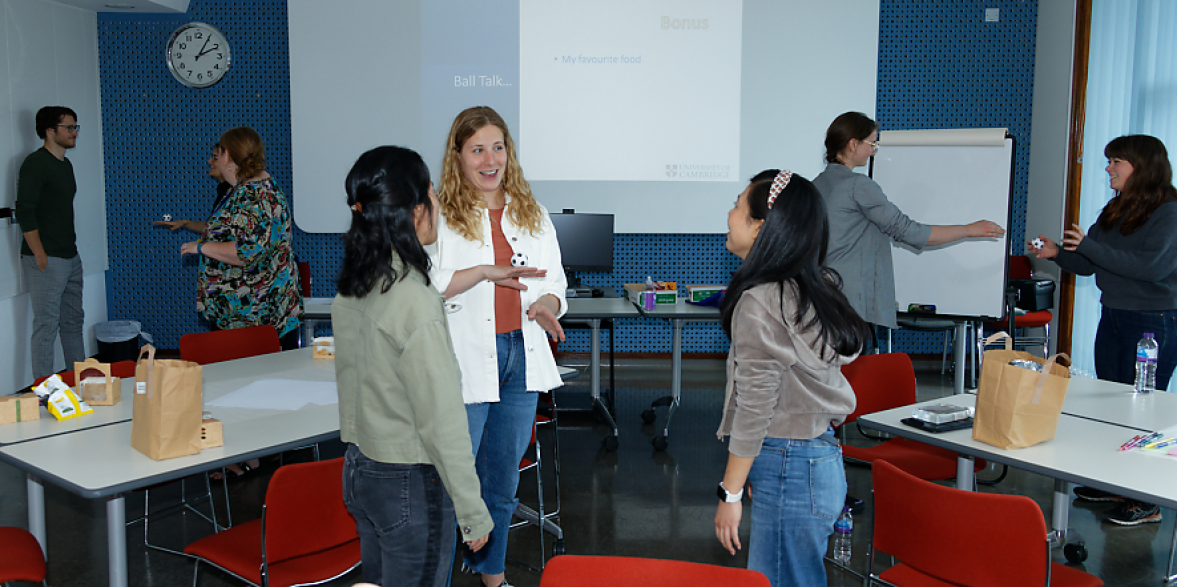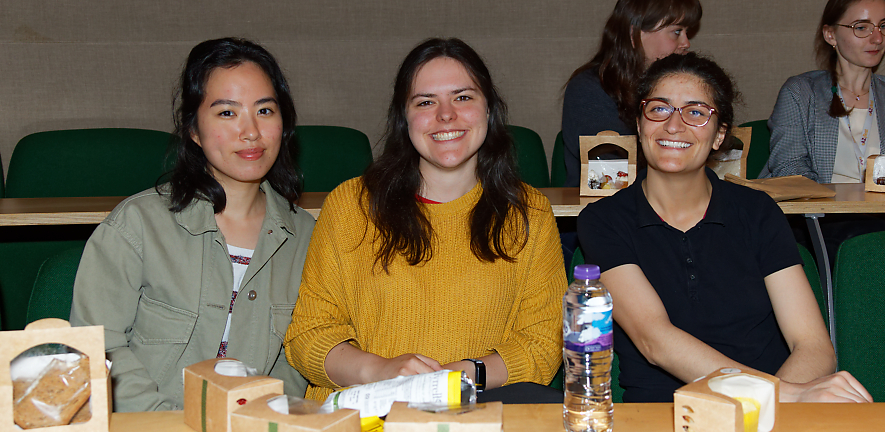
Brown bag lunches and discussion at the postgrad student focus event
Getting to know colleagues
Exhausting, lonely, challenging, receptive, improving – these are just some of the ways postgraduates described their Cambridge experience at a recent interactive session and workshop organised by the Postgraduate Education Team.
“One of the main goals of the workshop - after two years of Covid-related lockdowns and disruption - was to give postgrads a chance to meet and get to know their colleagues,” says Postgraduate Education Administrator Kerry Carruthers. The afternoon was also designed with the serious purpose of getting the students’ feedback and ideas on how to improve training, communications and support in the department.
As students gathered in the Unilever Lecture Theatre lobby for their free brown bag lunch, they didn’t know what to expect. First year PhD student Lorrie Jacob, who is being supervised by Dr Alex Archibald and Dr Chiara Giorio in the Atmospheric Chemistry RIG, said: “I don’t know what to expect, but I am hoping to meet some of my cohort and get to know some people.” Mushtari Saidikova, a first-year physical scientist supervised by Dr Giorio, Dr Anja Schmidt and Prof Clive Oppenheimer (Dept of Georgraphy), agreed: “One of the key reasons I am here is to get to know everyone,” she said.
Teja Venkatesa Perumal, who is completing an MPhil in Professor Andrew Wheatley’s group on the production of solar fuels (ie, the conversion of solar energy to valuable fuels), was excited about the afternoon’s activities. She said she was looking forward to improving the socialisation of students in the Department. “When I first arrived I tried to start a What’s App Group, but it was already two months into the year – it would have been helpful to have something in place when I joined. I’d also like opportunities to meet others, not just to meet, but to improve collaboration and have opportunities for intellectual conversations,” she explained.
“Creative, constructive feedback like this, direct from students, is exactly what we need,” says Kerry. “The last two years have been particularly difficult for everyone and we are very keen to improve the Postgraduate experience. It is great to finally be able to host an event like this as it helps us to better understand what our students are looking for and what they feel we can do to improve.”
A chance to get out of the lab and talk to each other
Deputy Head of Department Dr Nick Bampos introduced the session, saying: “We are great because of the people we attract – which is you. We want you to feel part of a cohort of great scholars who are keen to learn from each other. The friendships that you forge here will follow you for the rest of your life—you’re destined to do great things.”
Nick encouraged the students to take this opportunity to get out of their labs and talk to each other, noting: “The worst pressure in a high-pressure environment is the pressure you put on yourself.” He pointed out that the afternoon was a chance to get out of the work environment and relieve pressure, concluding: “Events such as this encourage you to tell us what we can do for you. We care about you – if we provide the right culture you will be productive – that’s good for you, good for the department, and good for science.”
Fabio Albertani, a fourth-year postgrad in the Thom group, explained that there is a student-led networking committee which wants to be active, but that Covid had made it difficult. He said that for the first time since the pre-Covid Christmas party in 2019, the committee is hoping to put on a first-year report submission party in June, but that they needed other students to help. Fabio noted that he is about to begin writing up, saying: “It’s up to you guys now.”
Open discussions
The group then moved to the Todd Hamied room for an interactive afternoon of games, small group discussions and problem-solving exercises, designed to illuminate the issues and problems the students faced, and also to come up with possible solutions.
The four main topics included support for postgraduates, the postgraduate training programme, cohort building and networking, and how to streamline the communication and admin processes.
During the course of the afternoon, students in small groups had a chance to list the good things they had experienced during their time in the department, as well as the things they felt needed improvement.
Michelle Wan, a second year PhD student who is applying Artificial Intelligence to environmental science, described her experience, which many of the other postgrads recognised: “I started in autumn 2020, right at the start of one lockdown. In 2021 there was another, so it felt like my first year didn’t even exist. It was a very tough first two terms,” she said. Michelle said it does feel like things are starting to get better. “I wasn’t able to meet people in person before – during lockdown we had to schedule to meet through Teams, but now it feels so nice to meet people by chance in the department.”
Areas which students felt needed improvement included: lack of promotion of available services (unawareness), more personal career journey talks, expensive, impostor syndrome (converse of feeling special!), unclear group communications and dynamics, lack of social events, sometimes lack of support or direction from supervisors, feeling of a lack of community, needing workshops or advice on writing grants and getting funding, lack of money for conferences, wanting more frequent opportunities to present, academic politics or being surrounded by stressed people, racism/sexism or other issues.
Some of the good things the students listed were: support from supervisors and teams, the researcher development programme and departmental training, freedom to choose your own research, diversity, easy to find others with expertise to ask questions, exciting science projects, meeting amazing researchers, the unique Cambridge experience, sports, getting a broad skill set and great resources in the Cambridge area.
Throughout the workshop, the students were encouraged to name gaps in support, the reasons for them, and to suggest possible actions for improvement.
After an afternoon of open discussion interlaced with games and activities, which offered support for issues to be aired and discussed openly, it was time to celebrate with more food in the form of Aromi flat breads, salads and pizzas, and more time to socialise.
Everyone seemed to enjoy the afternoon, not only as a way to discuss issues, but also as one of the first postgrad social events post-Covid. As Haseem Deen Mohamed Sarif Mohamed Iqbal, a 1st year PhD student in Professor David Wales's group, said: “I enjoyed the day, this was the first time I got to meet other people since I started my PhD and I am glad I came.”
Actions speak louder than words
All outcomes from the workshop are being discussed by the Postgraduate Education Team and an action plan being put into place- watch this space!
The Postgraduate Education Team would like to thank everyone who attended for their valuable input and would like to encourage anyone interested in joining or helping with events in the future to email postgraduate.education@ch.cam.ac.uk
Below (from left): Michelle Wan, Lorrie Jacob and Mushtari Saidikova looking forward to finding out more about the event

